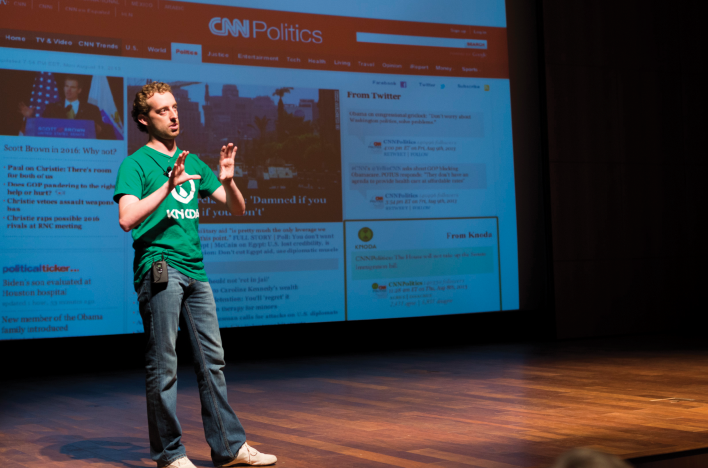Care to guess which basketball teams will make it to the 2014 Final Four?
What about the next presidential election? The next small business to become a household name? Or even when your son will finally propose to his girlfriend?
Then put it in writing.
Two local entrepreneurs, Kyle Rogers and James Flexman, have found a way to turn predictions—something most Americans make daily on an informal basis—into a startup. In December, the two launched Knoda, a prediction tracking platform.
The business allows users to document their predictions, broadcast them to the world—and then feed their ego a little, should they be proven right.
To up the ante, users receive a score based on their forecasting aptitude.
The startup is receiving assistance from the Digital Sandbox KC, a nonprofit designed to provide proof-of-concept resources to startup businesses. Knoda’s co-founders said the Sandbox help was invaluable.
The validation of being picked for the Digital Sandbox KC was equally important. It helps legitimize a business that basically provides a way for aspiring know-it-alls to say: “I told you so!”
“It’s kind of an ego thing,” acknowledges Rogers. “It’s fun to be right.”
Looking Ahead
Knoda lets users decide what kinds of things they want to predict. There are predictions about the next Kardashian divorce, the Big 12 basketball champ and this offered by user “LC” about her alarm clock: “I will walk across the room to hit snooze twice.”
Maybe it sounds a little goofy, but there is major interest in predictions.
When the co-founders presented at SparkLabKC this summer, they offered these facts: More than $2 million was wagered on the new royal baby’s birth in the United Kingdom. UNLV estimates more than $300 billion bet annually on sports. Blogger Nate Silver predicted the presidential results, and a tweet about his prediction received more than 2,300 retweets.
“People make predictions all the time,” Rogers said.
Rogers and Flexman—who worked together at Sporting Innovations, a tech group spun from Sporting Kansas City—understand that side bets will undoubtedly take place. But, to be clear, the two don’t want to run afoul of any federal or state laws. They have no immediate plans to collect money through the site.
“(Betting is) not a game we will be formally participating in in any way,” Rogers said.
Eventually, the company will look at advertising. Rogers and Flexman are still working out how it will work, but they want ads to have utility for users. They don’t want to risk ad fatigue.
They also think there could be a market for licensing the data. Perhaps the producers of “The Bachelor” would be interested in showing aggregated data live during a show? Or Knoda could use the data to help a company conduct an honest analysis of their product—a modern-day focus group of sorts.
‘My Prediction Is That They Will Be Successful’
Knoda started as an iPhone app, and this month Knoda predictions will be available on its website. The company plans to launch an Android app by March 1.
It all comes just in time for March Madness. Sports represents more than 60 percent of the predictions for now. But Rogers sees endless possibilities for business, politics and much more once users get started.
The launch was possible in large part because of the Digital Sandbox.
“Digital Sandbox helped us build out the back-end technology infrastructure for Knoda. That enabled us to build our iPhone beta product,” Flexman said. “Without that, I’m not sure we would be here today as it was the initial beta product that helped us secure our funding.”
Other startup owners are taking note as well because Knoda has managed to take something people do daily—make predictions—and spin that into something fun and interactive.
Davyeon Ross, co-founder of startup ShotTracker, said Flexman and Rogers are innovative, creative and unafraid of challenges.
“The fact of the matter is that I think they have what it takes to make this successful,” Ross said. “My prediction is that they will be successful.”

